– It is cool to see that the last Swiss guys who took medals at JWOCs, they are now in the elite team and they are now the World Champions. So for me, that’s cool to see my future will maybe be the same, says Swiss Florian Schneider – winning gold (sprint) and silver (long) at JWOC in Czech Republic this year.
And I was there at the starting line and I wanted to win the gold medal – that was the wrong point, there I made a mistake.
Read on to get to know how and why Schneider “lost” the middle distance and won the sprint distance. Read about his mental and physical preparations – and get to know the JWOC Champion better through this extensive interview! Schneider might very well be a man which we will see a lot of in the future of international orienteering.
This interview was done by the JWOC 2013 staff just after JWOC – who kindly allowed it to be republished here at World of O. Read on for the complete interview below (with some minor changes, and addition of maps/links).
Q: Before JWOC you said :”I think that for the Czech terrains it’s important to have a great speed.” Was this true in the end, or in other words – was the speed so important at the distance long as you supposed?
After JWOC I can say for sure that the speed was important. But I underestimated the technical part a bit (as you can see at the 10th control in long [Editors comment: See JWOC long GPS-analysis here and the map illustration below] and also in the whole middle-distance).
It was really tricky in all competitions – specifically in sprint and relay.
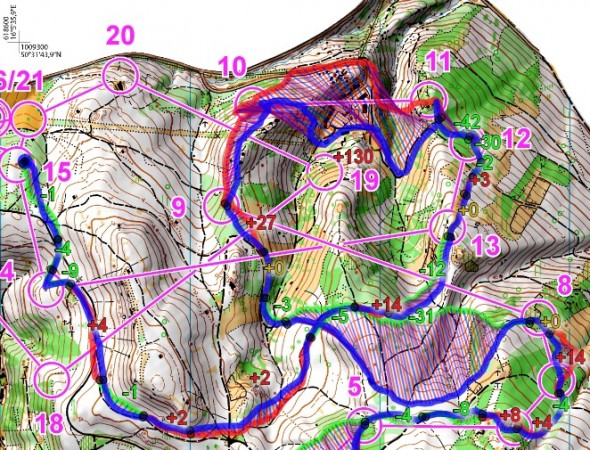
Illustration: Comparison between winner (Parfianowicz, blue line) and Schneider (red line where slower than Parfianowicz, green line where faster). To control number 10 Schneider effectively looses the race due to a mistake on the control itself – loosing 1:19 to Parfianowicz – more than he was behind in the end.
In the middle distance race it wasn’t the problem of the terrain – I was so bad; it was a mental problem
Q: You also said “Fortunately, the terrain in the Czech Republic is similar to the Swiss one, so I hope that a lot of normal trainings here in Switzerland are the best way how to prepare for the JWOC 2013.” Was it like this, or were you surprised in some way – at middle for example?
No, I wasn’t surprised – maybe only in relay. There I expected more hard green and for that also some fast running parts. But the other terrains were exactly what I thought about. We were there in spring and so the idea from the terrain was getting better and better. And we have really similar terrain here in Switzerland.
In the middle distance race it wasn’t the problem of the terrain – I was so bad; it was a mental problem. But the terrain was nearly the same we saw in spring.
I write all these things down and analyse them, rewrite and learn them
Q: You said “I spend a lot of time with mental training and that’s maybe a bit special in comparison to other guys.” It looks now, that it works. Would you reveal a little bit more, how your mental training looked like?
It’s not that easy to explain it! I talk a lot about my orienteering skills with my coach and we try to find every little mistake in every technical part and after that do it better and better. So I write all these things down and analyse them, rewrite and learn them. And then train during an alternative training to repeat what I wrote…
And I do also a lot of visualising-trainings: like sitting on home trainer and read the map – and get the feeling as if you are running actually now.
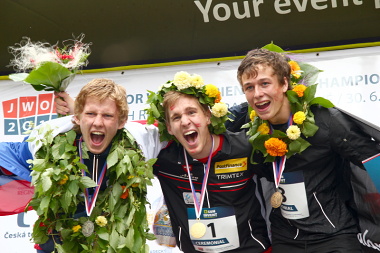
Photo: Top 3 in JWOC sprint – Photo (C) JWOC 2013.
Q: Looking at you at the finish of long, you apparently knew, that you are running for a good result. But have you believed in medal at that moment? Looking at your map, you did some mistakes (6 and 9 about 15 sec, 10 even 1:45), so perhaps there were some reserves?
Hmm, to be honest – when I came into the finish I knew it would be a very good result. I thought it could be 3rd or 4th place. I didn’t think about winning this competition or getting the second place.
I hoped for a medal when I changed my clothes and talked with my coach after the race. Although I knew about my mistakes… But I had such a great speed the whole race, I felt so good and I know that I’m a good uphill runner – so for me it was one of the best achievement I’ve ever made in an international race. That’s why I knew it would be a good result. But then I got the second place and this was unexpected and also a very special – although I’m the first looser…
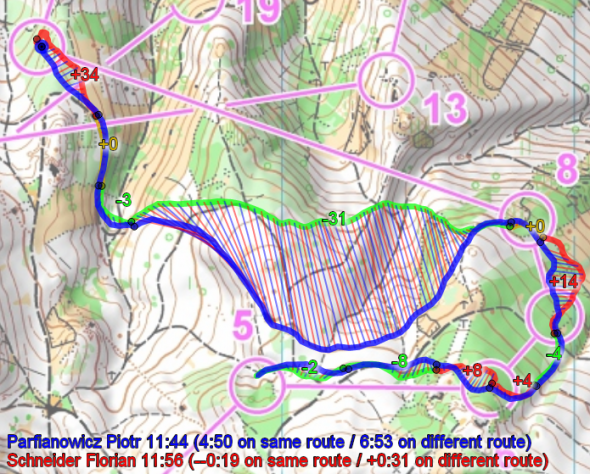
Illustration: Comparison between winner (Parfianowicz, blue line) and Schneider (red line where slower than Parfianowicz, green line where faster) between control 5 and 9. Good route choices by Schneider makes the mistakes towards the control less significant.
Q: What did you expect from yourself in long taking into consideration your health problems with knees?
I am good runner uphill, I am good at compass – I should run straight
I knew that I could train really well the whole year, so for me it was top 15 which maybe I would be able to reach. Last year I was the tenth and I had quite similar problems in the winter. This year I had the problems little bit longer, and my way was different from the last year, I trained more alternative, but I knew apelisis is very good for me, so I said to myself: “Maybe top 15 is normal and top 6 could be possible when I have a great one”.
I prepared at home the route choice, and where I saw it doesn’t make such difference running around or straight, I said to myself: “I am good runner uphill, I am good at compass – I should run straight”. I guess this tactic was really good, not at beginning of the race, but then at the end I had the power also to push harder directly, and I guess for me it was the best to do that.
Q: Last year, your best result was just from middle, now it was quite other way round. Simply to tell – you can be good in any discipline, and it happens, that one can make mistakes at any race…?
I guess: yeah you can say it like that. This year I really want to get a medal – especially in the middle distance. So I started a little bit too aggressively and searched the first control – that’s our sport!
Illustration: Map JWOC middle distance 2013.
Q: … and you finished as the 14th. What happened there?
I was aiming for middle distance as my best discipline because I had a medal from the last year. I have prepared for this race for a year. I spoke with my coaches that this would be my day. We went here in spring with the national team and we had also trainings in similar terrains, and I felt really good. I knew I would be able to get a medal there. After the long distance, I thought that I should run faster and better than in the long distance so I would win a gold medal. And I was there at the starting line and I wanted to win the gold medal – that was the wrong point, there I made a mistake.
then I remembered some words from Daniel Hubmann, he told me once that I should run every race like it’s the last one
After that I was starting too fast, didn’t read the map that exactly and was running with too hard risks and then missed the first control for two minutes. When I punched the control, I saw Emil Svensk. He came and I knew “it’s over” but then I remembered some words from Daniel Hubmann, he told me once that I should run every race like it’s the last one. So I tried to push hard together with Emil and I think we had good speed. For me it was important to see that I am able to run like the world champion. Yeah, the rest of the race was really good, but when you make a mistake for two minutes, then it’s over. But now I can see I didn’t give up then, and that’s important for the next races.
The fourteenth place is not too bad. After the race, my coach told me: “You are top 15, and you always want to be in top 15 when you have a normal race.” And my race wasn’t really normal, it was worse. But it’s cool for me to see that I am able to take medals in all distances. That will help a lot in future because I guess you don’t have to say “it’s my discipline and I will only train this”. You should train every discipline. Then you have more chances to get medals. So that’s good for me. And it is also cool to see that the last Swiss guys who took medals at JWOCs, they are now in the elite team and they are now the world champions. So for me, that’s cool to see my future will maybe be the same.
I think I can do my job in every discipline. Not as I thought this winter that I’m only a middle distance runner
I think I can do my job in every discipline. Not as I thought this winter that I’m only a middle distance runner…
Q: What happened after the middle distance race? What did you tell yourself that you were able to concentrate on the sprint distance and to become the world champion?
It was difficult. I had a lot of conversations with my coach. He said: “You don’t have to run like you will win. You should run a good race.” I realized that in the long distance I did my job. And then I thought “yes, maybe he is right” and I tried to focus on the new race. Sprint is so different from middle distance. It was quite easy because my plan was to have a top ten place, and I would be very happy with the top ten place.
Yes, it was also from deep inside me that this feeling came that I would be top ten and not better. And I think that’s why I had this good race in sprint. I think mental tuning is my big plus, but also my big minus. I can lose the race and I can win the race when I run mentally bad or good.
Q: Were you surprised after the sprint that your performance was enough to take the gold medal?
I was because I made mistakes. I made two mistakes for five seconds on the fourth and sixth control so I lost about ten seconds there, and as I said I am not that fast as the others. Last year I was 65th in sprint, the year before 55th. So I thought, yeah, someone would be faster than me, someone would have the perfect race.
But now I’ve realized that my race was quite perfect because it was a really cool and difficult sprint and I think it was not possible to run without mistakes in this sprint. Even if you do this, then you are not that fast and you won’t take some medal. Now I understand why I won, but after the race, I didn’t understand it, really.
Illustration: Map with Schneider’s golden route from JWOC sprint. Click for full map from omaps.worldofo.com.
Q: You said in the interview before JWOC that “I’m dreaming of winning a medal with our relay team.” Here perhaps the fortune told, that you have already enough medals. You started your race at the third leg at the position 3 minutes down from medal – I suppose, that you still wanted to fight, as you never know what might happen. But after small mistake at 3, you did quite unusual mistakes. How did you feel on start – after such successful week, you could be probably satisfied and mentally relaxed. But were you already pushing too hard and nervous in the end or was it too „green“ and complicated? And was Jonathan Crickmore unbeatable in the end?
I could say it wasn’t my day – but that’s too easy
The relay was the bad thing at JWOC for me and I feel so sorry for the other two guys in my team that I didn’t make my job! I could say it wasn’t my day – but that’s too easy.When I was on the starting-line I didn’t think about the races before – I focused on relay and I knew everything is possible so I should just go on… But I don’t know what happened after then, when I run to my map I was blocked and not focused in orienteering and I felt so bad so I couldn’t run fast… That’s why I made these mistakes and was down in the end.
When Jonny caught me up and run in front of me I thought I can beat him on my way to the last controls, but I wasn’t able to follow him – I was too tired. I guess I still don’t know what happened between the sprint and relay but this is the point where I should search the fault…
Q: So you were the only medalist from your country at JWOC, what do you think your friends did wrong? Could perhaps one of the differences be right in the mental training?
They didn’t do anything wrong. Christoph Meier was two times on the 5th place – it could be also two times 2nd place… The difference isn’t that big. Jonas Egger was 12th in long distance and he has one more year! And also the other three boys (Yves Aschwanden who was 21st in long, Sven Hellmüller (17th in middle), Remo Ruch (who is only 17 years old now) have still time and I’m sure they will be good.
And also the girls-team is so young – it was the first JWOC for all of them, so you can’t expect a medal from them…”
Q: You said before JWOC that “I want to fight for medals, but there are 10 more guys capable of winning every single race.” What runners did surprise you with their result – both better than expected and worse than expected?
I don’t like to talk about names much … but I was surprised of Michal Hubacek in sprint. Although I knew from EYOC 2010 that he’s a good sprinter I was a little bit surprised. And also about Tim Robertson.
The other boys who took medals (and diploma) where the people I thought about.
Like the Swiss man Christoph Meier – I knew he can take top 10 or better!
It wasn’t a week for Thor Nörskov – but I guess he will make it really better next year!
Q: What is your overall impression from this JWOC? What will come as the first on your mind when someone says JWOC 2013?
I got a lot of messages from all orienteering in Switzerland, also from the good ones from Finland and they told me “your future will be really nice”
For sure it is the World Champion in sprint. I never thought I could take the World Champion title and I made it. I got a lot of messages from all orienteering in Switzerland, also from the good ones from Finland and they told me “your future will be really nice”. I guess these emotions are quite the most impressive.
But also the whole week because I never was at the competition with that good organization – it was so cool with lots of fans, TV controls, the speaker – Per Forsberg was crazy. It is really special and you do your job well at the competition like that. So I am really happy for the whole week. I had a lot of up and down – it was quite perfect long distance, middle distance really bad, and then the sprint gold medal came… After the sprint I told my coach I never was as happy as I am now.
Q: How did you like the atmosphere at JWOC? Almost all runners living together, how many new friends do you have on facebook since then? :-)
I really, really liked the atmosphere! It was as if we were the stars for one week – and when you do it well it’s more special at all!
It was funny to meet a lot of people which I knew from the last JWOC and EYOC and get some new friendships. And you can learn so much from other runners, get some invitations from all over the world – which will help a lot when you would like to visit a country. I don’t accept all questions on facebook because when I don’t know them really then it’s a bit special to be „friends“ on facebook – but I got a lot of questions.
For myself it was really special at JWOC because everyone knows my name, talks with me and everything like that – but I’m just a normal person. All these people made the week so special for me and I’m very thankfully to all of them.
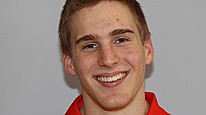 Q: You said ahead of JWOC that “I have been fighting with some problems with my knee since 2009.” Is this still not recovered?
Q: You said ahead of JWOC that “I have been fighting with some problems with my knee since 2009.” Is this still not recovered?
No it’s not recovered so that I would be able to run that much. I’m still running only 3-4 hours in a week and I guess it will not change that hard for the next time…
I still have these problems when I run too much – so I can not run much.
But my knee is now in a really good shape and I was able to run the whole JWOC-week without problems.
This will be my future life – but I saw that I don’t have to run that much. Doing good alternative training is similar! I guess my way is not the “normal” way and not better or worse.
Q: So how did your training look like? You talked about alternative training, tell us something more about it.
the doctor told me in winter that I won’t be able to run longer than 30 minutes
It is my secret! No, no, no! :-) My problem is quite easy to describe, it’s just a “runner’s knee”, but even if you have some problems with your knee, it’s not always the same and every person has his own problem and my problem is that my knee has a lot of rotation so that’s why I always get this runner’s knee and that’s also why the doctor told me in winter that I won’t be able to run longer than 30 minutes… It was in February when I was in the hospital again for visiting the doctor and he told me: “No, now you have this problem with rotation so I guess you won’t be able to run long.” First I tried to give up and finish with my orienteering career but my physiotherapist told me: “It’s possible to train this rotation and to get it better and better.”
we try to train hard when I run, but not that hard when I do alternative training
Even though I could not run as much as the others, I have a really good coach for my physical training. He is the husband of Anita Weyermann, the best 800 m runner from Switzerland, and he knows a lot about doing alternative training because of her – she had also big problems, so we try to train hard when I run, but not that hard when I do alternative training. I try to run 10 or 15 minutes really hard, but the rest of the training is easy and long, like 90 minutes cycle on home trainer or 90 minutes on cross trainer stepping and everything like that.
And also swimming – I went a lot to the swimming pool and it was not always funny there. I am a nature person so I want to be outside, but my training is maybe 80 % indoor. In winter, it was difficult to train outside. And also when I want to do quality training on cycle, then I should go longer than 2 hours outside or 60-70 minutes indoor. If I had time to go outside, I would go outside. So we had this change that I would run 20 minutes fast, come home, 10 minutes do nothing and then go to home trainer for more than 90 minutes so I have had like 2 hours trainings.
Q: No warm-up jogging before this 20-minutes fast running?
In winter it was not better than 3:20 so why should I warm up really long for this pace, it’s not that fast
The first minute is like warm-up, then to push harder and harder and get a good pace, but I haven’t had that high speed as the others have – I am not able to run less than 3 min/km, maybe 3:20 is my highest speed, maybe now 3:10 or little bit better.
But in winter it was not better than 3:20 so why should I warm up really long for this pace, it’s not that fast, and my coach told me it’s not important to run better than 3 min/km. In orienteering, we should have the power to run into the forest, and that’s why we did a lot of training uphill and also into forests, not only running on a street as 10 km flat running. It was a lot of uphill and I think that’s also my big plus that I can run like that. So I am also happy that my mother gave me this plus :-).
Q: You said you did running only for 20 minutes, but the long distance at the JWOC took you 70 minutes. What was the longest running before this championship?
In April, I was able to train 30 minutes, then in May 45 min orienteering.
In April, I was able to train 30 minutes, then in May 45 min orienteering. I stopped with running and made more orienteering trainings. And then I had a test race in Switzerland, it was 69 minutes, that was our long distance test race which I won :-). I was also running Jukola. That was 82 minutes for me. But that was too long, last ten minutes it hurt in my knee. But I knew it was normal, so I can run 90 minutes maybe, and that will be also ok. So I had two races similar to the JWOC long distance, and the JWOC was the third one.
Q: What do you feel that you should still improve? For example your personal best at 3 km on athletic track since 2011 is 10:07, compared to other friends from this years‘ team (9:33 to 10:08) – how important do you see this measure? I see this fact extremely interesting, considering that you are the sprint champion…
I have so much to learn before I’ll be good enough to fight with the big stars – and this step is hard
I should learn to run faster on flat-running because there I lose a lot of time (like you wrote). My 3km personal best is actually 09.47 but I run this four years ago… I never run a fast 3km after then because I was always injured. I guess it is important to have this speed – especially when you will be good in senior-class. I guess it depends on which kind of terrain it is. When you see JWOC 2012 in Slovakia: the sprint was flat and the most important thing there was just to run very fast. This year sprint was more uphill – breaks of running and difficult parts and also some stairs – then it’s not that important to have this maximum-speed. Then it’s important to have a constant speed.
For running in forest I guess no one cares about the 3km time… It’s a big difference between running flat on a track or in forest – but: As I wrote: when you will get a medal in senior class you have to be fast EVER.
I have so much to learn before I’ll be good enough to fight with the big stars – and this step is hard…
Q: What does it mean for you that you have such great athletes as Daniel Hubmann, Matthias Kyburz, and so on around you in the Swiss team? Are they like your heroes, or rather training partners?
And also from Simone – she is maybe the best to teach something because I guess she knows everything
I guess it’s both. Little bit they are heroes because they are so good. And it’s also cool that you can train with them, and see all the differences… We talk a lot together so you can learn a lot of good things from them about orienteering but also about competitions. Matthias Kyburz told me this year: “You will see, it will be very hard to run with a medal, to know you had a medal last year, and you will have a medal this year.”
There I’ve learnt a lot. And also from Simone – she is maybe the best to teach something because I guess she knows everything. And also the men, like Daniel, he knows about injuries, he knows about being the best, and also had some bad races. I guess that’s why we are that good in the Swiss team because we have so many good runners and we speak together.
Q: How many gold medals do you think that Simone will win in the future? :-)
The good thing with Simone is, that she doesn’t run for winning medals. I guess she is still running because she realy loves this sport – so if she doesn’t loose here fun, I’m sure she will make it to 25 gold…
Q: Well, next year, you are 21. How difficult do you feel that it might be to get into seniors‘ team or how many years might it take until you will go for a world cup race? I think, that at WOC in Finland, Swiss team was behind expectations (though sometimes it is question of seconds …), perhaps you should show them how to do it? :-)
I’ll focus on my training and get closer to the good boys in Switzerland for the next 2-3 years
This step from junior to senior is so big and hard, so it will take some years until I can maybe run world-cup or WOC. I’m dreaming of running in 2016 in Sweden – and this is also a big goal for me. And also the EOC in Czech in 2016 – because I really like this terrain! And it would be funny to run there 3 years after my crazy week at JWOC…
Until then, I have to have a lot of patience because in the Swiss team there are ten runners who can be a world champion and you are behind them, so the next two years would just be to find my good training pace and find some good ways to train, not only like I did this year because motivation would go away I guess when I train two years like that and don’t get some feedback like I have got it now from the JWOC.
I’ll focus on my training and get closer to the good boys in Switzerland for the next 2-3 years – and during this time I guess I won’t be able to run many international races (maybe WUOC or military-World-champ). And then we will see if I can catch them up or not. I think they know all how to get medals, better than everyone other…
There are a lot of things I can learn from them, and nothing they could learn from me, because they are all better and better. :-)
My big dream is to get a medal until 2020, and maybe the World Championship will be in Switzerland then again. It’s just a dream – but you have to have a dream, always!
Q: Well, so thank you, good luck with your dreams and let them come true!
Interview prepared by Petr Kadeřávek and Lenka Klimplová and Jan Exner. “>The original interview is available from the JWOC 2013 webpage.
 World of O News
World of O News
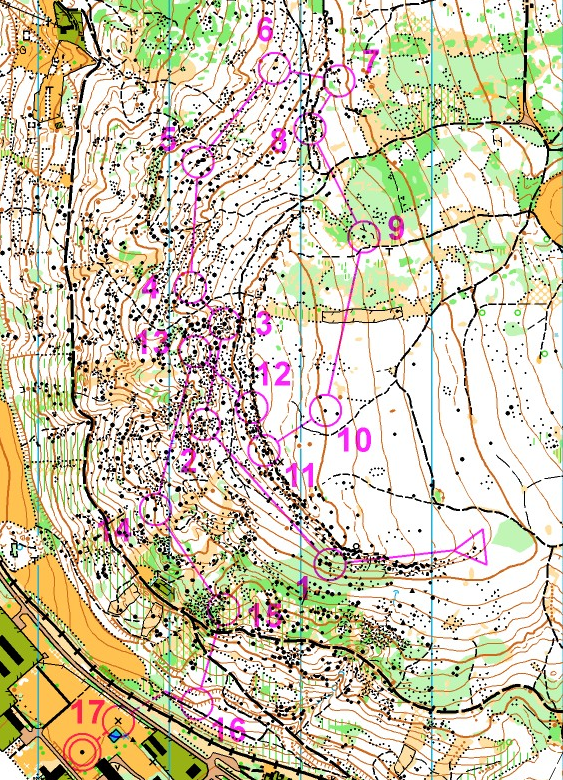
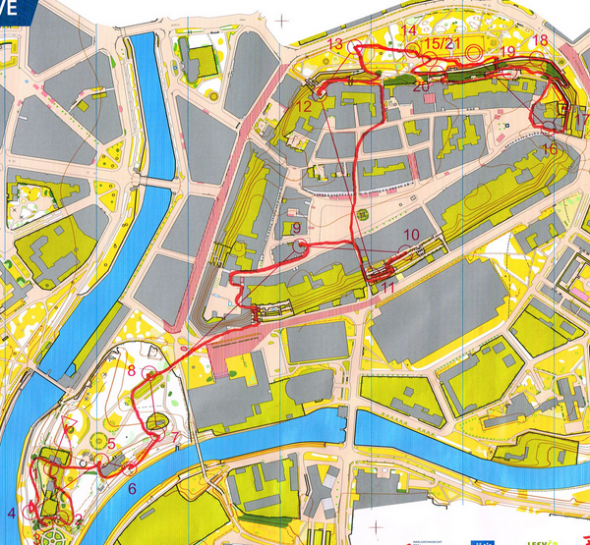
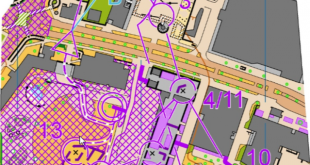
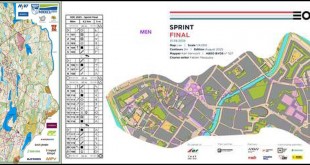
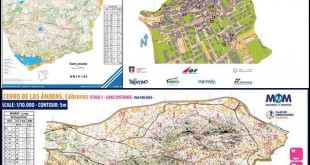
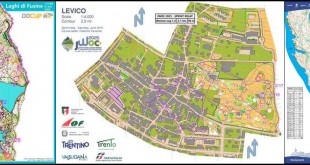
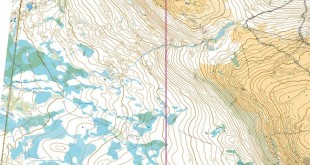
Really great reading! Congratulations again with the impressive performances!